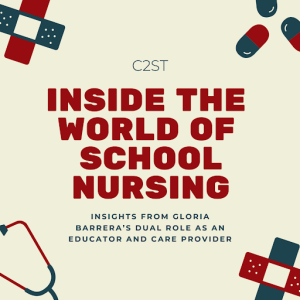Inside the World of School Nursing: Insights from Gloria Barrera’s Dual Role as Educator and Care Provider
By Ella Coley, C2ST Intern, Waubonsee Community College
Gloria E. Barrera, MSN, RN, PEL-CSN (Certified School Nurse), plays a crucial role in her students’ daily lives at a high school in the Chicago suburbs, leading the school health services team, providing healthcare services to over 2,500 students, and serving as the chief health compliance officer. Additionally, she is a co-director of the online RN to BSN program at the University of Illinois Chicago (UIC), overseeing a high-quality, rigorous program designed for the working registered nurse. The RN-BSN program focuses on enhancing clinical thinking, evidence-based practice, health assessment skills, leadership and management ability, quality and safety knowledge, nursing informatics utilization, population-focused nursing and health promotion, and an overall understanding of the broadened role of the nurse and issues facing nurses and healthcare in the US and globally. She also serves on various nursing boards at the state and national levels to advocate for progress and equity in the nursing field. In this interview, Barrera discusses her background in nursing, the challenges and rewards of her current role, and advice and information on nursing school. Her 16+ years of experience offer valuable insight into how nursing professionals contribute to a healthy and supportive school environment, aiding the entire community.

From The Beginning
Gloria’s passion for nursing and healthcare first sparked in her youth. After spending time in a coma as a toddler and hearing her family’s stories about the compassionate nurses who cared for her, she felt a deep connection to the field and was inspired to pursue the career. Once she completed high school, she attended Saint Xavier University and graduated in 2007 with a Bachelor of Science in Nursing (BSN). She then became a nurse at a level 1 trauma center, where she worked for two years helping patients with severe injuries and needing critical care. However, she missed the aspect of public health that she experienced as an undergraduate in her community health nursing rotation. During that rotation, Barerra learned of her passion for connecting with others and building relationships with patients over time. The environment of trauma nursing doesn’t include much long-term care that allows for a deeper connection with patients. This ultimately led her to follow her passion and change specialties to become a school nurse and nurse educator.
Life As A School Nurse
When asked about a typical day as a school nurse, Barrera explained that it varies. School nurses’ daily responsibilities include providing care, health screenings, and education to students, including but not limited to, emergency preparedness, triaging injuries and illnesses, and coordinating care Barrera shared, “I know that as a school nurse, I’m bridging the gap between healthcare and education every day”. Barrera is driven by a strong commitment to community and building connections, values that drew her to the field of school nursing. This specialty allows her to provide continuity of care by establishing long-term relationships with students throughout their high school years and supporting their growth and development–an aspect she finds deeply rewarding. Passionate about fostering a safe and caring environment for students, staff, and community, Barrera acknowledges that the presence of a school nurse in every building is essential for fostering a safe, healthy, and supportive learning environment. She emphasizes that this is something “we’re advocating for at the national and state level, because every child deserves access to a school nurse, no matter their zip code.”
Nursing Student Advice
With her extensive experience, Barrera brings valuable insight and guidance to nursing students. When reflecting on her own education, she noted that, during her time in nursing school, there was a limited focus on the public health and community aspects of nursing. Entering the field, she quickly learned the critical role of community connection – a component now increasingly integrated into nursing curricula.
When asked what surprised her about transitioning to professional practice, Barrera highlighted the remarkable prevalence of innovation within nursing. She describes nurse innovators as engineers in the field, continuously addressing challenges and developing solutions that enhance both the efficiency and quality of patient care.
For students aspiring to enter the profession, Barrera emphasizes the importance of finding a mentor. A good mentor leverages their experience to offer guidance, helping new nurses navigate challenges, identify growth opportunities, and ultimately support their professional development in the field.
Final Thoughts
In speaking with Nurse Gloria Barrera, I gained valuable insight into the everyday realities of a school nurse, nurse educator, and public health leader. Her stories highlight the challenges and rewards of the jobs, showing how vital the public health role of a school nurse is to care for the students and staff. Her valuable position as a nurse educator to undergraduate students is crucial for building up the next generation of nurses across all specialties. If you’d like to learn more about Gloria E. Barrera, click here. If you’re interested in her work in nurse education as an RN to BSN Program Co-Director, click here, and if you want to learn more about how to join the RN to BSN Dual Admission Program, click here!